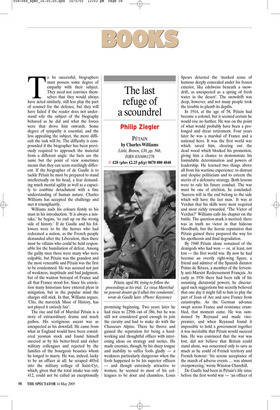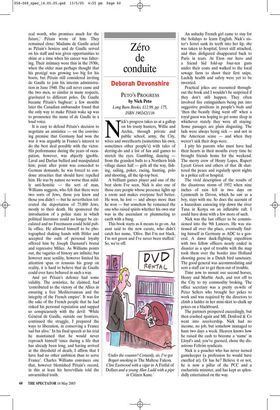The last refuge of a scoundrel
Philip Ziegler
PÉTAIN by Charles Williams Little, Brown, £30, pp. 568, ISBN 0316861278 ✆ £28 (plus £2.25 p&p) 0870 800 4848 To be successful, biographers must possess some degree of empathy with their subject. They need not convince themselves that they would always have acted similarly, still less play the part of counsel for the defence, but they will have failed if the reader does not understand why the subject of the biography behaved as he did and what the forces were that drove him onwards. Some degree of sympathy is essential, and the less appealing the subject, the more difficult the task will be. The difficulty is compounded if the biographer has been previously required to approach the material from a different angle: the facts are the same but the point of view sometimes means that they can seem startlingly different. If the biographer of de Gaulle is to tackle Pétain he must be prepared to stand intellectually on his head, a feat demanding much mental agility as well as a capacity to combine detachment with a fine understanding of human nature. Charles Williams has accepted the challenge and met it triumphantly.
Williams nails his colours firmly to his mast in his introduction. ‘It is always a mistake,’ he begins, ‘to end up on the wrong side of history.’ If de Gaulle and his followers were to be the heroes who had redeemed a nation, as the French people demanded after the Liberation, then there must be villains who could be held responsible for the humiliation of defeat. Among the guilty men there were many who were culpable, but Pétain was the grandest and the most venerable and Pétain was the first to be condemned. He was accused not just of weakness, ineptitude and bad judgment, but of the wanton betrayal of France and all that France stood for. Since his conviction many historians have entered pleas in mitigation, but in the popular mind the charges still stick. In that, Williams argues, ‘Clio, the maverick Muse of History, has not played it entirely fair’.
The rise and fall of Marshal Pétain is a story of extraordinary drama and much pathos. His vertiginous ascent was as unexpected as his downfall. He came from what in England would have been considered yeoman stock and found himself sneered at by his better-bred and richer military colleagues and rejected by the families of the bourgeois beauties whom he longed to marry. He was, indeed, lucky to be an officer at all; he scraped 403rd into the military college of Saint-Cyr, which, given that the total intake was only 412, could not be called an exceptionally promising beginning. Two years later he had risen to 229th out of 386, but he was still not considered good enough to join the cavalry and had to make do with the Chasseurs Alpins. There he throve and gained the reputation for being a hardworking and thoughtful officer with interesting ideas on strategy and tactics. He made enemies, though, by his sharp tongue and inability to suffer fools gladly — a weakness particularly dangerous when the fools happened to be his superior officers — and though extremely attractive to women, he seemed to most of his colleagues to be dour and charmless. Louis Spears detected the ‘marked sense of humour deeply concealed under his frozen exterior, like edelweiss beneath a snowdrift, as unexpected as a spring of fresh water in the desert’. The snowdrift was deep, however, and not many people took the trouble to plumb its depths.
In 1914, at the age of 58, Pétain had become a colonel, but it seemed certain he would rise no further. He was on the point of what would probably have been a prolonged and drear retirement. Four years later he was a marshal of France and a national hero. It was the first world war which saved him, clearing out the dead wood which blocked his promotion, giving him a chance to demonstrate his formidable determination and powers of leadership. He learned two things above all from his wartime experience: to distrust and despise politicians and to esteem the merits of a defensive strategy. Both lessons were to rule his future conduct. The war must be one of attrition, he concluded: ‘Success will in the end belong to the side which will have the last man.’ It was at Verdun that his skills were most required and most richly rewarded. ‘The Victor of Verdun?’ Williams calls his chapter on the battle. The question-mark is merited; there was in truth no victor in that hideous bloodbath, but the heroic reputation that Pétain gained there prepared the way for his apotheosis and final degradation.
By 1940 Pétain alone remained of the demigods who had won — or, at least, not lost — the first world war. By now he had become an overtly right-wing figure, a friend and admirer of the Spanish dictator Primo de Rivera, a member of the fervently anti-Marxist Redressement Français. As early as 1936 there had been talk of his assuming dictatorial powers; he discouraged such suggestions but secretly believed that one day it might fall to him to play the part of Joan of Arc and save France from catastrophe. As the German advance swept across France and resistance crumbled, that moment came. He was summoned by Reynaud and made vicepremier, and when Reynaud found it impossible to hold a government together it was inevitable that Pétain would succeed him. He was convinced that the war was lost, did not believe that Britain could stand alone, was concerned only to save as much as he could of French territory and French honour: ‘his serene acceptance of the march of adverse events ... was almost overpowering,’ wrote Winston Churchill.
De Gaulle had been in Pétain’s life since before the first world war — ‘an officer of real worth, who promises much for the future,’ Pétain wrote of him. They remained close: Madame de Gaulle acted as Pétain’s hostess and de Gaulle served on his staff and was given opportunities to shine at a time when his career was faltering. Their intimacy wore thin in the 1930s, when the older man perhaps thought that his protégé was growing too big for his boots, but Pétain still considered inviting de Gaulle to join his interim administration in June 1940. The call never came and the two men, so similar in many respects, gravitated to different poles. De Gaulle became Pétain’s bugbear: a few months later the Canadian ambassador found that the only way to make Pétain wake up was to pronounce the name of de Gaulle in a loud voice.
It is easy to defend Pétain’s decision to negotiate an armistice — on the convincing premise that Germany had won the war it was arguably in France’s interest to do the best deal possible with the victor. His performance during the years of occupation, however, was abjectly ignoble. Laval and Darlan bullied and manipulated him; point after point was conceded to German demands; he was forced to condone atrocities that should have repelled him. He was by nature no worse than mildly anti-Semitic — the sort of man, Williams suggests, who felt that there were two sorts of Jews, those you knew and those you didn’t — but he nevertheless tolerated the deportation of 75,000 Jews, mostly to their death. He sponsored the introduction of a police state in which political literature could no longer be circulated and no Freemason could hold public office. He allowed himself to be photographed shaking hands with Hitler and accepted the oath of personal loyalty offered him by Joseph Darnand’s brutal and repressive Milice. As Williams points out, the vagaries of history are infinite; but however near senility, however limited his attention span or tenuous his grasp on reality, it is hard to believe that de Gaulle could ever have behaved in such a way.
And yet Pétain’s defence had some validity. The armistice, he claimed, had ‘contributed to the victory of the Allies in ensuring a free Mediterranean and the integrity of the French empire’. It was for the sake of the French people that he had risked his personal reputation and supped so conspicuously with the devil: ‘While Général de Gaulle, outside our frontiers, continued the struggle, I prepared the ways to liberation, in conserving a France sad but alive.’ In his final speech at his trial he maintained that he would never reproach himself ‘since during a life that has already been long, and having arrived at the threshold of death, I affirm that I have had no other ambition than to serve France’. Charles Williams convinces one that, however blemished Pétain’s record, in this at least his hero/villain told the unvarnished truth.



































































 Previous page
Previous page